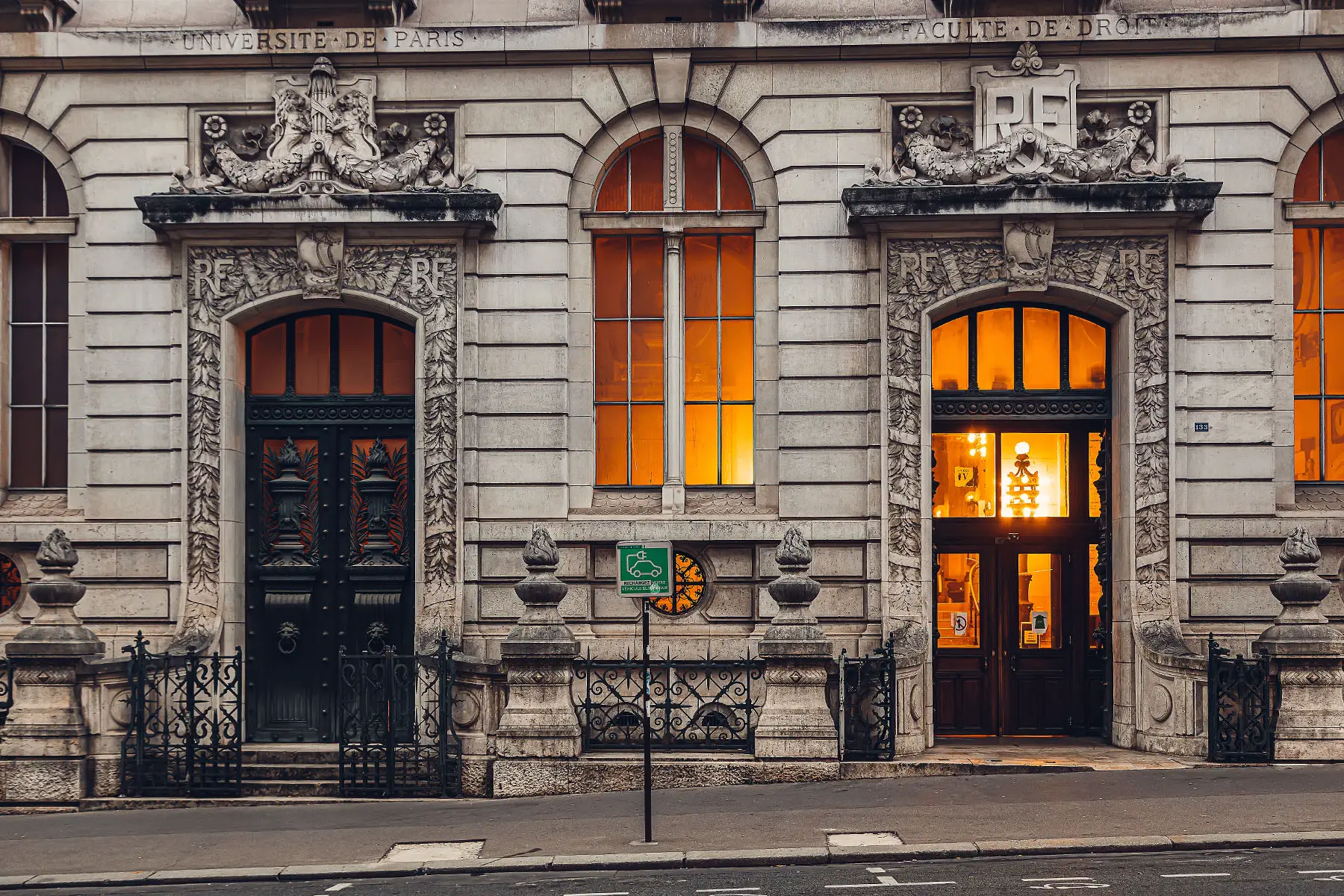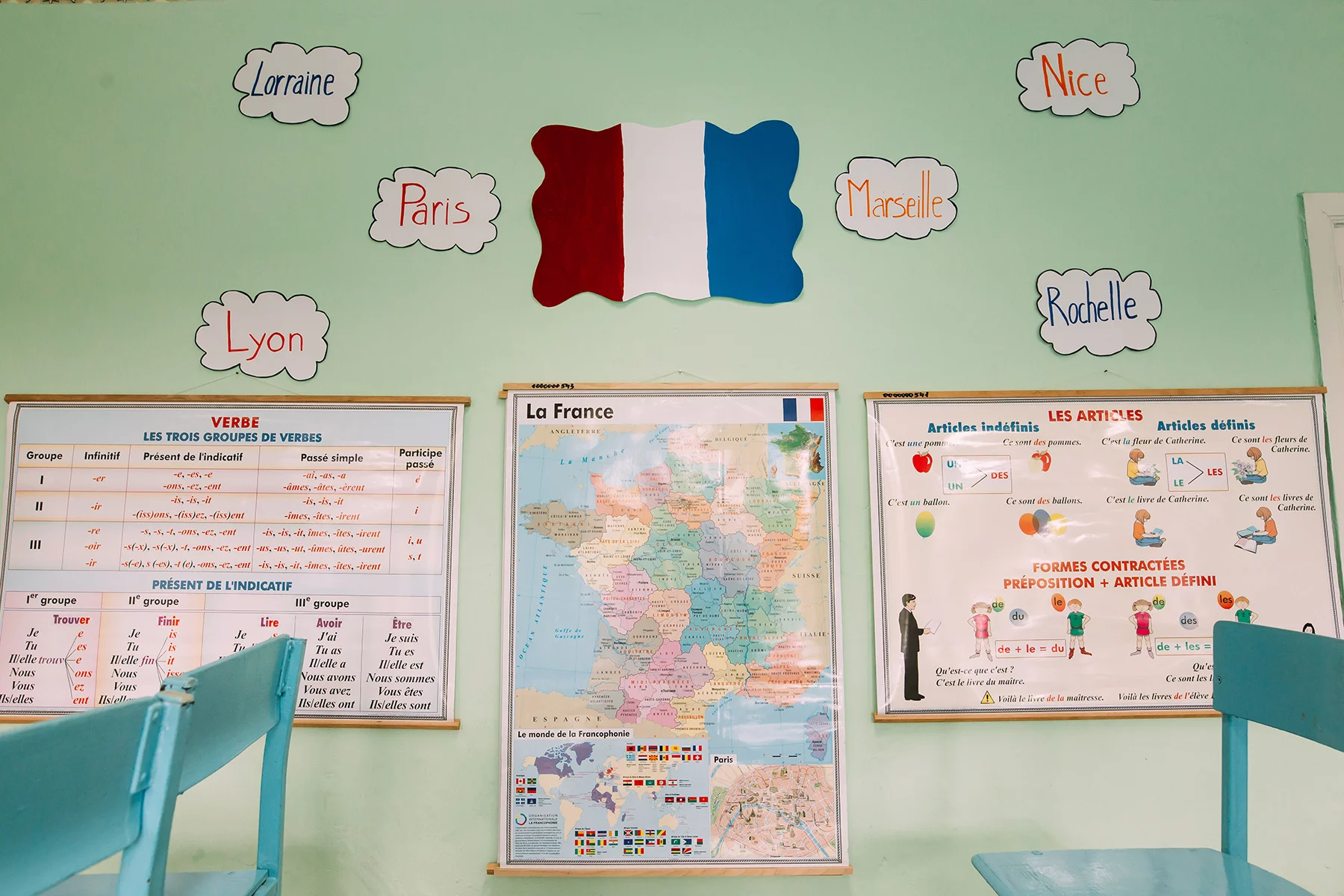French higher education is known for its top quality, ranking fifth best in the world in 2021. This is one of the main reasons why the country is among the top 5 study destinations for international students, where 14% of students are expats.
Not sure where to begin? Keep reading for more information on:
Sirelo
It's no secret that moving abroad can be stressful. Sirelo's team of removal advisers is here to help. They provide five free quotes from international shipping companies so you can find the best options at the best prices. Take the stress out of your relocation to France with Sirelo.
Higher education in France
After completing high school (lycée) at age 18, most students will go for a national diploma (diplômes nationaux) from a higher education institution.

There are three types of institutes in France:
- Universities
- Grandes écoles (i.e., elite universities), such as ESSCA
- Specialized schools (e.g., art and architecture institutes)
These can be both public and private. Higher education falls under the responsibility of the Ministry of Higher Education and Research (ministère de l’Enseignement supérieur, de la Recherche et de l’Innovation – MESRI). They accredit universities and ensure the recognition of degrees in France.
Vocational degrees
Students who are interested in skilled crafts or trades can study for a(n):
- Advanced Technician Certificate (Brevet de Technicien Supérieur – BTS)
- Advanced Agricultural Technician Certificate (Brevet de Technicien Supérieur Agricole – BTSA)
- Technical University Diploma (Diplôme Universitaire de Technologie – DUT)
- Scientific and Technical University Diploma (Diplôme d’Études Universitaires Scientifiques et Techniques – DEUST)
- Vocational bachelor’s degree (Licence Professionnel or Licence Pro)
The BTS, BTSA, DUT, and DEUST programs take two years (i.e., 120 ECTS) and aim to get you onto the job market quickly. It can be followed by one additional year of study (i.e., 180 ECTS), leading to a Licence Pro.
After the Licence Pro, students can choose to pursue a master’s degree (e.g., in engineering). However, only 8-25% of students (depending on the sector) decide to do so.
Academic degrees
Students with a penchant for theory can choose to get a university degree. In France, these are called:
- Bachelor’s degree (License) – the most common are Bachelor of Arts (BA) and Bachelor of Science (BS or BSc)
- master’s degree (Master) – the most common are Master of Arts (MA) and Master of Science (MS or MSc)
- PhD (Doctorat)
- Accreditation to Supervise Research (Habilitation à Diriger des Recherches – HDR)
Bachelor’s degrees generally take three years (or 180 ECTS). After that, you can specialize in your field with a master’s degree. This typically involves another two years (or 120 ECTS). If you want a career in academics, you can pursue a PhD (another three to six years) and an HDR diploma (up to a year). This last one is necessary for becoming a professor in France.

In 2021-2022, over 1.63 million students (in French) were enrolled in university. Of these, 32% opted for an arts and humanities degree, 20% for a science degree, and 15% for a law degree.
Find more information on:
Other degrees and study programs
If you have gone to high-school in France, you will have earned your:
- Technical School Certificate (Brevet d’Études Professionnelles – BEP)
- Certificate of Professional Aptitude (Certificat d’Aptitude Professionnelle – CAP)
- Vocational diploma (Baccalauréat Professionnel or Bac Pro)
- General diploma (General Baccalauréat – Bac)
- Technical diploma (Baccalauréat Technologique – Bac Techno)
With the above, you can continue to study for your:
- Professional Certificate for Youth, Popular Education, and Sport (Brevet Professionnel de la Jeunesse, de l’Éducation Populaire et du Sport – BPJEPS) – for students who want to become a sports educator or facilitator
- Engineering Degree (Diplôme d’Ingénieur – DI) or Agriculture Engineering Degree (Diplôme d’Ingénieur Agriculture – DIA)
- National Arts Diploma (Diplôme National d’Art – DNA) – a three-year bachelor course for art students
- National Diploma in Crafts and Design (Diplôme National des Métiers d’Art et du Design – DNMADE) – a three-year bachelor course for students in the field of applied creation and design
- Higher National Diploma in Plastic Expression (Diplôme National Supérieur d’Expression Plastique – DNSEP) – a two-year master’s degree for art students
- University Diploma (Diplôme Universitaire – DU) or Establishment Diploma (Diplôme d’Établissement – DE) – one-year programs that are offered by universities, rather than the MESRI. As such, diplomas are often not recognized by the state.
- Specialized Master (Mastère Spécialisé – MS) – not so much a diploma, as a ‘quality label’ given by Grandes Écoles
- Preparatory Classes for the Grandes Écoles (Classes Préparatoires aux Grandes Écoles – CPGE) – also known as prépa, this two-year program prepares you for the Grande Écoles
Students can also sign up for the Erasmus+ program, which allows them to study or gain work experience in another European country. Non-EU Master students can register for the Erasmus Mundus program, which allows them to study at several universities in France, Europe, and beyond.
General requirements for studying in France
Educational qualifications
Each school and university sets its own admission criteria for its programs. In general, you’ll only need a high-school diploma (Bac or foreign equivalent). In some cases, prior professional experience is also sufficient.

Depending on your study program, you might also be asked to write a motivation letter or pass an entrance exam (e.g., for music studies).
Language requirements
Most undergraduate courses are taught in French and you will need at least a B2 (intermediate) level to be able to study in France. International students can prepare their language skills with a course from Diplôme d’Études en Langue Française (DELF) or Diplôme Approfondi de Langue Française (DALF). After that, they must take a mandatory language test as part of their university application.
If you have a French high school diploma from an AEFE institution (Agence pour l’Enseignement du Français à l’Etranger), you are exempt from this language requirement.
Visas for international students
International students from the EU or EFTA area (Iceland, Liechtenstein, Norway, and Switzerland) don’t need a visa to study in France. Those from outside that region do.
For more information, see our article on study visas in France.
Getting foreign qualifications recognized
EU degrees are officially recognized in France. That said, you might need to get them translated into French.
If your degrees are from a non-EU country, you can follow this 5-step government guide (in French) to get your foreign qualifications recognized. Once you have scanned and uploaded the required documents (e.g., ID, diplomas, and grades), you can file a request on the online platform France Education International. The process costs €70 and takes around three months to be completed.
How much is it to study in France?
Compared to other countries, study costs are extremely low, as the French government subsidizes public higher education. For example, the 2023-2024 tuition fee is just €170 for a general bachelor’s degree and €243 for a general master’s Degree.

These low tuition fees apply to all students from the EU/EFTA, Andorra, and Quebec, as well as international students who:
- Have a long-term residence card
- Have lived in France for more than 2 years
- Have refugee status or subsidiary protection
- Are enrolled in a doctoral program
- Are in the third year of a medical, dental, or pharmaceutical study
- Are doing a CPGE and are enrolled in a university degree course
- Were enrolled in a French Language Center (centre de Français Langue Étrangère, FLE) prior to the 2019/2020 academic year
International students who do not fall into the above categories cannot benefit from subsidized education. Instead, their annual tuition fees for public higher education are:
- € 2,770 per year at the Licence (bachelor) level
- € 3,770 per year at the Master level
The mandatory language test that all non-EU/EFTA students without a Bac must take costs €74.
If you want to attend a private school or university, you can expect to pay much higher tuition fees. Business and management schools are a typical example, where annual fees are generally between €7,000 and €18,000.
French scholarships and funding
If you need some help funding your study in France, you can find a list of scholarships on Campus Bourses. This website includes grants from governments, regional authorities, companies, foundations, and higher education institutions. You can filter your search by nationality, field, and level of degree program.
The French Foreign Ministry also offers scholarships for international students, including the Eiffel Program of Excellence (for master’s or PhD-level studies) and Excellence-Major (for the best foreign students graduating from a French high school abroad).
Lastly, you can contact your country’s embassy in France to see if there are any scholarships or funding available. For example, students from the US may be able to study in France with help from the Fulbright US Student Program.
How to apply for a study program in France
The application procedure depends on your nationality, where you currently live, and what and where you want to study in France.
| Who? | Degree | Application process |
| EU/EFTA students, or students with a French baccalaureate | Bachelor’s | Sign up via the platform Parcoursup |
| Master’s | Apply on the Mon Master platform | |
| Students from ‘Études en France‘ countries | Bachelor’s | Submit a Preliminary Admission Request (Demande d’Admission Préalable – DAP) on the Études en France platform |
| Master’s | File a DAP on the Études en France platform | |
| Refugee and stateless students | Bachelor’s | Sign up via Parcoursup. Be sure to check which requirements apply to your case. |
| Master’s | Contact the higher education institute directly | |
| Other students in France (none of the above applies) | Bachelor’s | Submit a DAP Green file (in French; DAP Dossier Vert) with a maximum of three universities |
| Master’s | File an application on Mon Master | |
| Other students abroad (none of the above applies) | Bachelor’s | Send a DAP White file (in French; DAP Dossier Blanc) to your local French embassy in your home country. |
| Master’s | Sign up via the platform Mon Master |
Student life in France
The academic year typically runs from September to June. There will be around 10-12 weeks of lectures from September to December, and another 10-12 weeks from January to April. After the Easter holidays, the third term (May-June) is largely taken up with exams.

Lectures can start as early as 08:00 and finish late in the evening. Some last three hours without a break. In the first years of university, students can expect to have very little one-on-one contact with lecturers. Depending on the subject area, programs can be divided up into lectures (cours magistraux) and participation classes (alternatively known as travaux dirigés (TD) or travaux pratiques (TP)).
Most universities and Grandes Écoles will have a vibrant social life and many associations you can join. However, it’s worth noting that most students live close to where they grew up and often go back home on the weekends. In other words, they also have a social life outside of the university sphere.
Student accommodation
There are nearly 780 university residences (Citiés-U) throughout France, which are managed by regional student-services agencies (Centre Régional des Œuvres Universitaires et Scolaires – CROUS). These offer the cheapest form of student housing (around €200 per month for a single room) and are often located close to university premises.
You can also find private student housing (known as a colocation) by searching on a platform like leboncoin.fr. Although it will be easier to find student accommodation nearby the university, your rent will likely be higher.
Cost of living
The French cost of living will depend greatly on where you live. Paris, predictably, is by far the most expensive city. This is most notably reflected in the cost of housing, transport, and social life.
To give you a rough idea, Numbeo estimates that a single person in Paris can expect to spend around €855 per month, before rent.
Working while studying in France
Students are allowed to work for a maximum of 964 hours a year (i.e., 60% of the legal working hours). If your work hours surpass that, you will no longer be recognized as a student and your visa might be revoked.
If you are from Algeria, you’re only permitted to work 50% of the legal working hours. This roughly translates to 803 hours per year.

Students are not allowed to be self-employed or do freelancing work.
Volunteering in France
International students looking to volunteer can contact their university’s volunteering service (bureau d’engagement étudiant). They will be able to tell you about any volunteering positions available in areas such as homelessness, environment, sports, youth camps, and the like.
If your French language skills are limited, there are also some volunteering opportunities in English. For example:
- Cancer Support France
- ChangeNOW
- English Pour Tout Le Monde
- Serve the City Paris
- SOS Helpline in English
Students from the EU/EFTA region can also take part in the French Civic Service (Service Civique). This paid volunteering program lasts anywhere from six to 12 months and covers a wide range of areas, including education, culture, environment, and international humanitarian action.
Student healthcare and social security
EU/EFTA students can use their European Health Insurance Card (EHIC) to access public healthcare in France.
All other international students must register for French social security. This service is free and will cover (some of) the healthcare expenses for the duration of your studies. Once you have received your certificate of enrollment (attestation d’inscription), you can sign up on the platform l’Assurance Maladie and order your French health insurance card (carte Vitale).
Because the social security net does not cover all medical expenses, it’s also recommended you take out private health insurance as well.
After finishing your degree
Many international students decide to stay in France after completing their degrees. Employers are particularly keen on graduates from the Grandes Écoles, and some job postings will even specify this as a requirement. Many positions increasingly require a Bac+5 diploma (i.e., master’s degree), even for entry-level positions.
If you’re from the EU/EFTA region, you can stay and find work without a work visa or residence permit. Citizens from outside that area will need to apply for a new residence permit. They’ll have the most luck getting approved for a temporary job seeker/new business creator residence permit (carte de séjour ‘recherche d’emploi/création d’entreprise‘). This permit is valid for a year and is not renewable.
Keep in mind that the student healthcare plan will expire after you complete your studies. It’s therefore advisable to sign up for health insurance before you leave university.
Useful resources
- Campus Bourses – a catalog with scholarships and grants for foreign students
- Campus France – a government resource in English with information for internationals looking to study in France
- Études en France – the official government website for students of Études en France countries
- Étudiant – a government resource in English with information for international and refugee students
- L’Étudiant – a great resource for understanding the French education system
- France Éducation International – information on French language courses around the world
- Ministry of Higher Education and Research – the official government website for higher education in France
- Mon Master – the online platform to apply for a master’s program
- National Office for Information on Education and Professions (Office National d’Information sur les Enseignements et les Professions – ONISEP) – a great government resource with information on education and employment in France
- Parcoursup – the online platform to apply for a bachelor’s program






